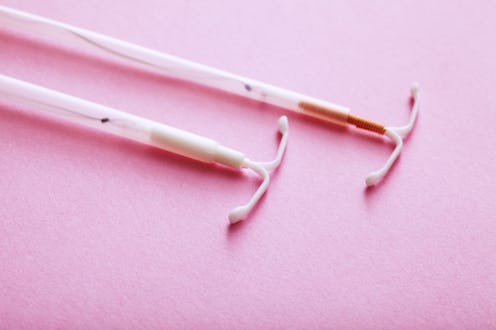Life
Here’s The Subtle But Important Difference Between Copper & Hormonal IUDs

In this week's Sex IDK column, Emma McGowan, certified sex educator and writer, answers your questions about the difference between copper and hormonal IUDs.
Q: Is the Mirena safe? And will the copper IUD have any impact on my hormones?
In the past few years, IUDs have become one of the most popular types of long-acting reversible contraceptives (LARCs). Sometimes I think I’m the only one of my friends without one! But despite their rise in popularity, people still have a lot of questions about them.
First, let’s talk about what an intrauterine device (IUD) is. An IUD is a t-shaped, approximately one inch object that is inserted into the uterus via the cervix. Both types of IUDs — hormonal and copper — are super effective at preventing pregnancy, with fewer than one person out of 100 who use IUDs getting pregnant within a year, according to Planned Parenthood. Believe it or not, they’re actually more effective than a vasectomy when it comes to preventing pregnancy! (That’s because people sometimes have unprotected sex too soon after having a vasectomy, which leads to some sperm sneaking through.)
But each type of IUD works to prevent pregnancy in different ways — here's how.
Hormonal IUDs
There are four hormonal IUDs on the market in the United States: Mirena, Skyla, Liletta, and Kyleena. They all have varying levels of the progestin hormone levonorgestrel, which is a synthetic form of the sex hormone progesterone. Your health care provider can help you pick the one that’s best for you. Hormonal IUDs last from three to five years, depending on the brand.
Hormonal IUDs prevent pregnancy in a two ways. The first is by making the mucus around your cervix thicker, which makes it more difficult for sperm to get through. The second is by preventing ovulation, which is when the egg leaves the ovary and travels down the fallopian tube. If there’s no egg in there when the sperm show up, then there’s no way to get pregnant! And a beneficial side effect is that many people report lighter — or even no — periods after one year with a Mirena.
The Mirena is very safe and the hormone it uses, levonorgestrel, has been studied for years and been found to have very few negative side effects. That said, it’s not for everyone. If you've had certain health conditions — like breast cancer and pelvic inflammatory disease, among others — your health care provider will likely recommend another form of birth control.
One thing that many people are concerned about when it comes to hormonal IUDs is the hormones. Maybe you had bad reactions to hormonal birth control in the past or you’re just not super into the idea of altering your hormones. Those are a both really common and valid! But you might be happy to know that, unlike other forms of hormonal birth control — like the pill or the patch or the shot — the hormone levels in the hormonal IUD are super low, and they stay localized in the uterus. That means that, unlike with oral contraceptives or shots or the patch, which distribute hormones throughout your blood stream, a hormonal IUD delivers the hormones only where they're needed. In fact, when researchers have tested blood in other parts of the bodies of Mirena users, the levels of levonorgestrel are so low that they’re basically undetectable.
All that’s to say that it’s unlikely that the hormones in a hormonal IUD will lead to the kinds of adverse reactions that people sometimes have to other forms of hormonal birth control. Not impossible, but unlikely.
Copper IUD
The other type of IUD is the copper IUD, which is sold under the name Paragard. The copper IUD doesn’t contain any hormones at all, so some people who are really sensitive to hormones might find it to be a better option.
So how does the copper IUD work? Instead of hormones, the copper creates a hostile environment for the sperm and eggs. It’s basically poison to them! (But don’t worry — it’s not poison to the rest of you, unless you have a rare condition called Wilson’s Disease, which your doctor can test for if that's a concern.) The copper IUD works for up to 10 years, which is significantly longer than a hormonal IUD.
You might be wondering why copper IUDs aren’t more popular. After all, they’re hormone-free, last a decade, and are super effective at preventing pregnancy! Well, unfortunately, they can come with pretty serious side effects. Many people using the copper IUD report significantly heavier cramping and bleeding during their periods.
Since pretty much no one is looking for a longer and more painful period, most health care providers will recommend a hormonal IUD before the copper one. But, as always, it’s your choice. If you really want the hormone-free one and your health care provider is trying to pressure you to get something else, don’t be afraid to stand up for yourself.
The hormonal and copper IUDs are both great options with different benefits, but while IUDs are excellent at preventing pregnancy, they do exactly nothing when it comes to protecting you against STIs. If STI protection is something you’re concerned about, you’ll have to stick with our old friend, the condom. But if your main concern is pregnancy prevention? You can't do better than an IUD.
Read more from Bustle's 'Sex IDK' column:
- 4 Tips That Can Make Giving Oral Easier If It Triggers Your Gag Reflex
- 6 Easy Things You Can Do To Make Our Culture A Little More Sex Positive
- Can A Partner "Tell" If You're A Virgin The First Time You Have Sex?